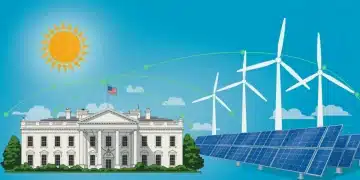Now energy policy discussion: what you need to know

The current energy policy discussion focuses on transitioning to renewable energy, enhancing energy efficiency, and promoting global cooperation to combat climate change and create a sustainable energy future.
Now energy policy discussion is more than just talk; it shapes our future. Ever wondered how new energy innovations could impact your daily life? Let’s dive into the conversation and uncover the essentials.
Understanding the current energy landscape
Understanding the current energy landscape is critical in today’s rapidly changing world. With new technologies emerging and climate concerns rising, we must stay informed about how energy affects our lives.
Key Factors Influencing Energy Today
Various factors shape the energy landscape. For instance, government regulations, market demands, and environmental impacts all play a crucial role. Each of these can affect energy prices and availability.
- Government policies promoting renewables
- Technological advancements in energy efficiency
- Global market trends affecting supply and demand
- Concerns over climate change and carbon emissions
Additionally, consumer preferences are changing. More people are looking for sustainable options and embracing alternative energy sources. This shift is creating new markets and opportunities.
Market Trends to Watch
Keeping an eye on market trends can help us understand the future. Many countries are investing heavily in renewable energy. This transition is not just beneficial for the environment; it also offers economic opportunities.
New developments in solar, wind, and other renewable sources are driving down costs and increasing accessibility. These changes mean that consumers can benefit from cleaner and often cheaper energy.
- Growth in solar and wind energy capacity
- Increased electric vehicle adoption
- Investments in smart grid technology
The energy landscape is evolving towards sustainability. Understanding these dynamics can empower individuals and businesses to make informed decisions, whether it’s choosing energy suppliers or supporting green initiatives.
Key players in energy policy
When exploring the key players in energy policy, it’s essential to recognize the various groups that influence decisions and actions. These players range from government agencies to private sector companies and advocacy groups.
Government Bodies
One of the most significant influences on energy policy comes from government bodies. They set regulations, implement laws, and promote initiatives that shape energy use.
- National governments create policies that affect energy production and distribution.
- Local governments may enforce regulations impacting energy efficiency standards.
- International organizations, like the United Nations, establish global energy goals.
These entities often work together to create frameworks that target sustainability and meet national objectives.
Private Sector Companies
The private sector plays a crucial role as well. Energy companies, from traditional fossil fuel providers to renewable energy firms, significantly affect how energy is produced and consumed.
They drive innovation in technology and participate in the market’s shift toward cleaner options. This competition fosters better solutions for energy consumers.
- Oil and gas companies adjust strategies based on market trends.
- Renewable energy companies advocate for the advancement of green technologies.
- Utility companies are essential for distributing energy to consumers efficiently.
Business interests often align with sustainability goals, creating a diverse market that responds to consumer demand for cleaner energy.
Advocacy Groups and NGOs
Advocacy groups and non-governmental organizations (NGOs) are vital in shaping public awareness and influencing policy changes. They often push for stricter regulations and promote energy efficiency.
These groups raise awareness about energy-related issues and advocate for policies that prioritize environmental health and climate change action. By engaging the public, they can create pressure on policymakers to make informed decisions that align with sustainable development.
Innovative technologies shaping energy policy

Innovative technologies are a key component in shaping energy policy. These advancements not only improve efficiency but also help in reducing the environmental impact of energy production and consumption.
Smart Grids
One of the most significant breakthroughs is the development of smart grids. These modern electrical networks optimize the delivery of electricity by using digital technology.
- Smart grids facilitate two-way communication between utilities and consumers.
- They enable real-time monitoring, allowing for better demand response.
- Advanced sensors and automation improve reliability and reduce outages.
With smart grids, energy providers can manage resources more efficiently. This technology also empowers consumers to control their energy use, leading to cost savings and reduced consumption.
Renewable Energy Innovations
Renewable energy technologies are also transforming the landscape. Innovations in solar, wind, and other renewables drive policy discussions towards cleaner energy sources.
As these technologies become more affordable, they encourage governments to implement policies that support their deployment. This shift not only benefits the environment but also boosts local economies.
- Advancements in solar panel efficiency make solar power more accessible.
- Wind turbines are becoming larger and more effective.
- Battery storage technology is maturing, allowing for better energy management.
By integrating these renewable sources, countries can reduce dependence on fossil fuels, thus aligning with global climate goals.
Energy Efficiency Technologies
Technologies aimed at improving energy efficiency are equally important. Energy-efficient appliances, LED lighting, and smart home technologies help minimize consumption.
As more people adopt energy-saving solutions, policies that promote these practices gain traction. This can lead to significant reductions in energy costs and lower environmental footprints.
The role of government in energy discussions
The role of government in energy discussions is crucial for shaping policies that influence energy production, distribution, and consumption. Governments are responsible for creating the legal framework that governs energy practices.
Policy Development
Governments develop policies that set the standards for energy use. These policies can encourage the use of renewable energy sources and promote energy efficiency.
- Incentives for renewable energy adoption.
- Regulations to lower carbon emissions.
- Support for research and development of new technologies.
Through these policies, governments influence how energy is produced and consumed. They can create a favorable environment for energy innovation and sustainability.
Regulatory Oversight
Another key function is regulatory oversight. Government agencies monitor energy markets to ensure fair practices and protect consumers. This oversight includes:
- Setting standards for energy pricing.
- Monitoring compliance with environmental regulations.
- Evaluating the safety and reliability of energy sources.
By maintaining regulatory standards, governments help ensure that energy remains accessible and affordable, while also promoting environmental protection.
Engagement in International Agreements
Governments also engage in international agreements that shape global energy policy. These agreements can address climate change and promote cooperation on energy issues.
Participation in treaties allows countries to collaborate on best practices and share technology. This global approach is essential for tackling complex energy challenges that affect the planet.
Future prospects for energy policy
The future prospects for energy policy are shaped by rapid technological advancements and evolving societal needs. As climate change concerns grow, policies must adapt to new energy demands and opportunities.
Transition to Renewable Energy
One significant future trend is the transition to renewable energy sources. Governments are increasingly focusing on policies that promote wind, solar, and hydroelectric power. This shift aims to reduce reliance on fossil fuels, which contribute to greenhouse gas emissions.
- Incentives for renewable energy investments.
- Research funding for innovative energy technologies.
- Regulations to phase out coal and other high-emission sources.
The support for renewables not only impacts energy policy but also drives economic growth and job creation in green technologies.
Energy Efficiency Policies
Enhancing energy efficiency will also play a crucial role in future policies. As technology improves, appliances and buildings will become more efficient, conserving energy while maintaining comfort and functionality.
Policymakers will likely introduce stricter efficiency standards, which can lead to significant savings for consumers and reduced environmental impacts.
- Standards for building insulation and energy use.
- Incentives for upgrading to energy-efficient appliances.
- Promotion of smart home technologies that optimize energy consumption.
As energy efficiency becomes a priority, consumers may find it easier to adopt sustainable practices.
Global Energy Cooperation
Finally, future energy policies will likely emphasize global cooperation. Climate change is a global issue that requires collective action. Countries will need to work together to share technologies, resources, and best practices.
Participation in international agreements can help align policies and promote a sustainable energy future. Collaborative efforts could lead to innovative solutions that no single nation could achieve alone.
FAQ – Frequently Asked Questions about Energy Policy
What is the focus of future energy policies?
Future energy policies will focus on promoting renewable energy sources, improving energy efficiency, and fostering global cooperation to address climate change.
How can renewable energy benefit communities?
Renewable energy creates jobs, reduces dependence on fossil fuels, and lowers energy costs, making communities more sustainable and resilient.
What role do governments play in energy policy?
Governments create regulations, offer incentives for clean energy, and engage in international agreements to promote sustainable energy practices.
How can individuals contribute to energy conservation?
Individuals can contribute by using energy-efficient appliances, adopting renewable energy solutions, and participating in local sustainability initiatives.





